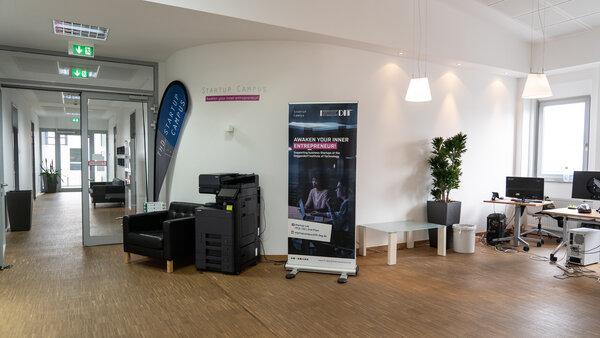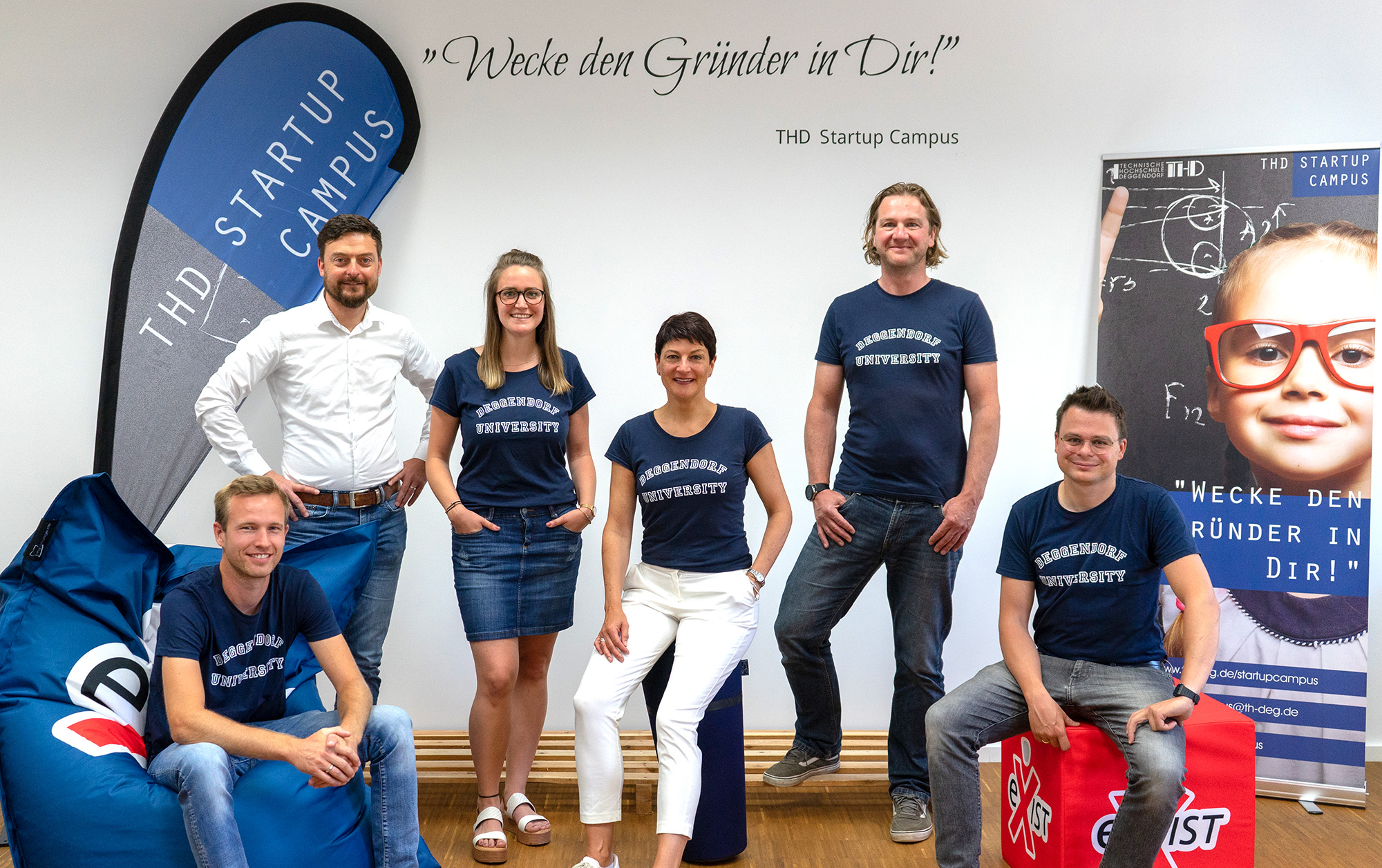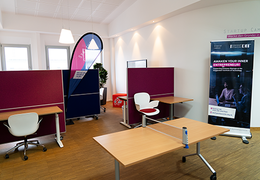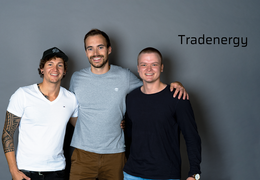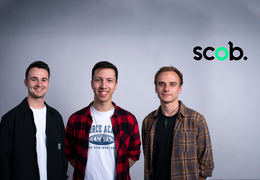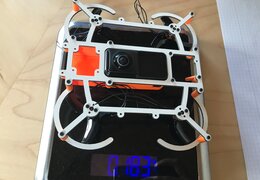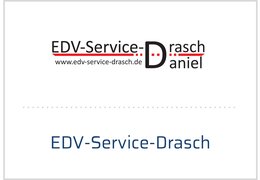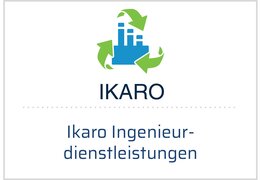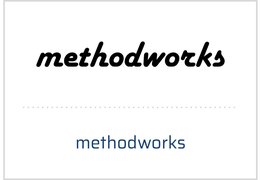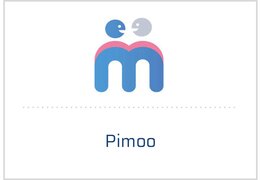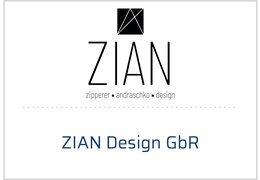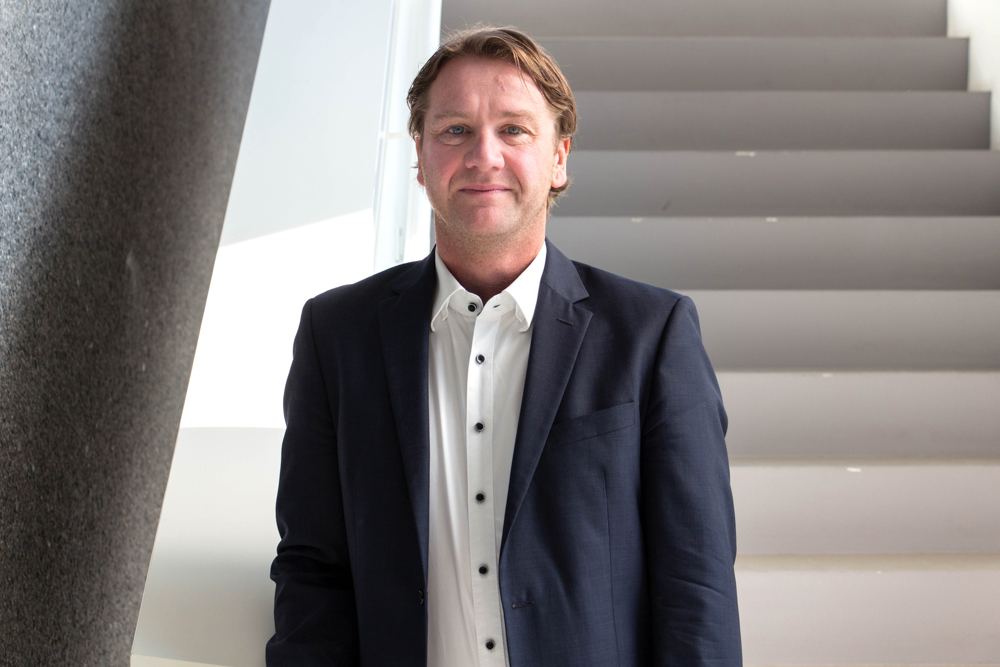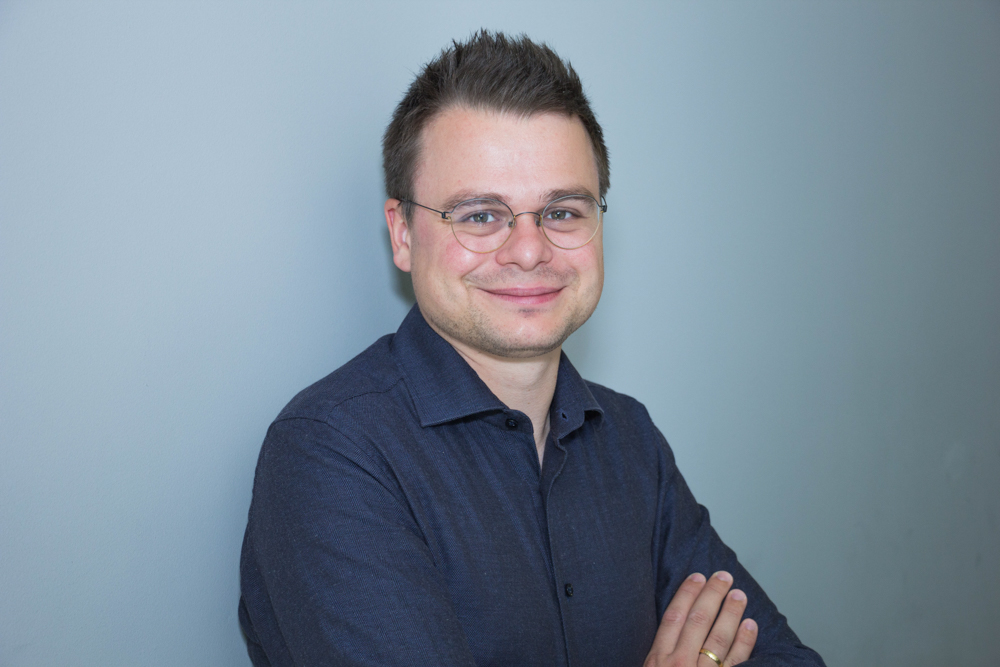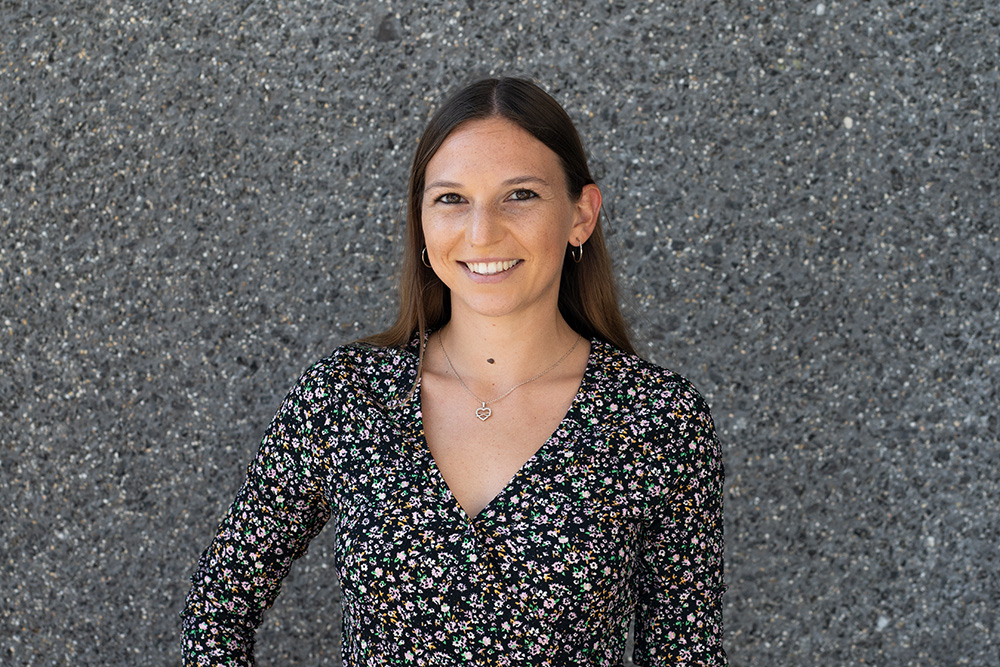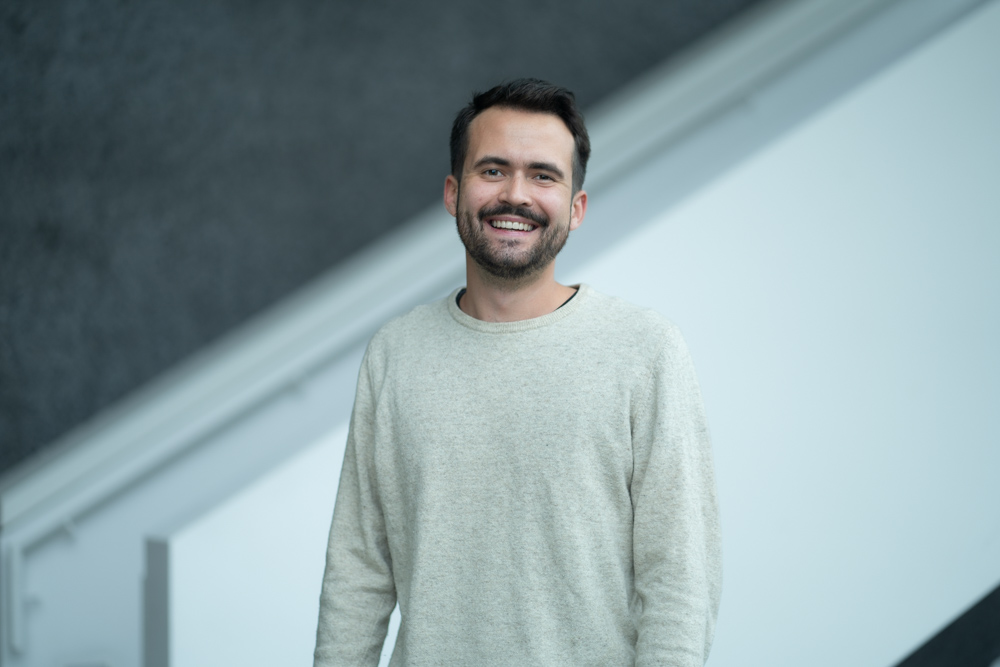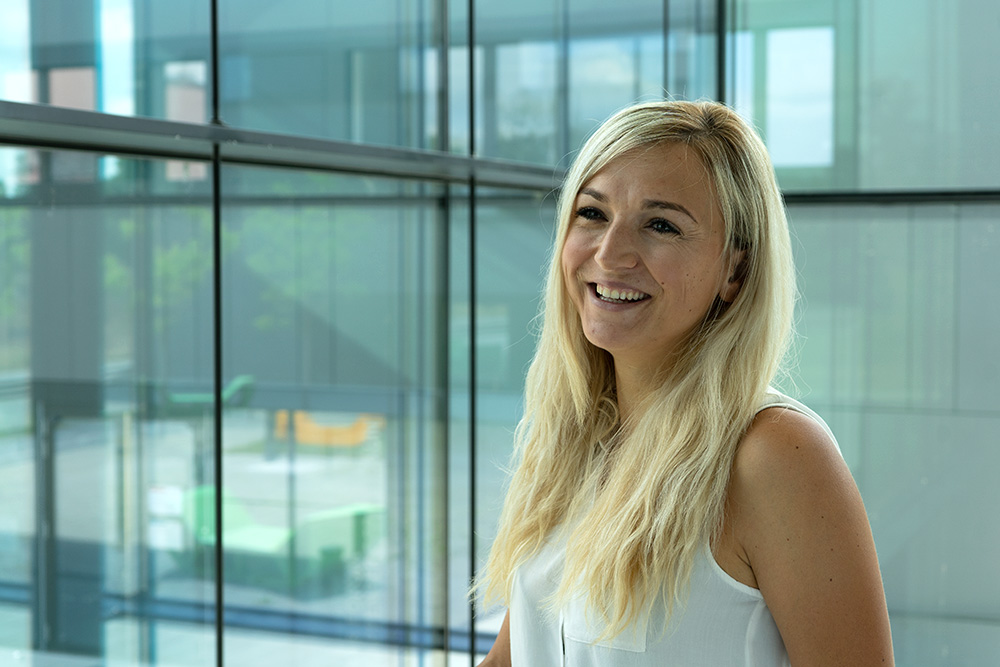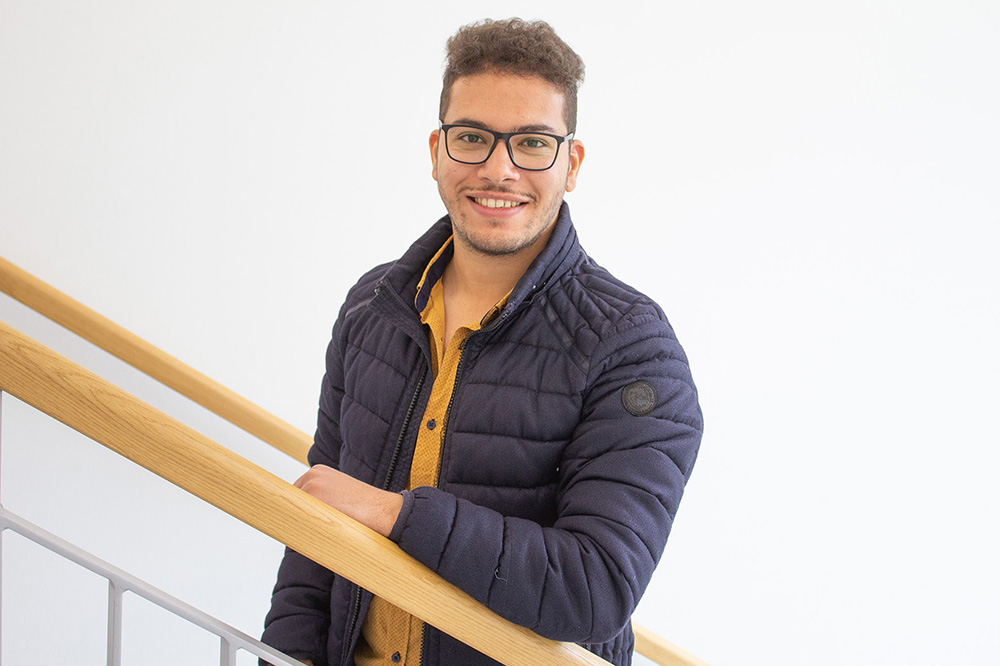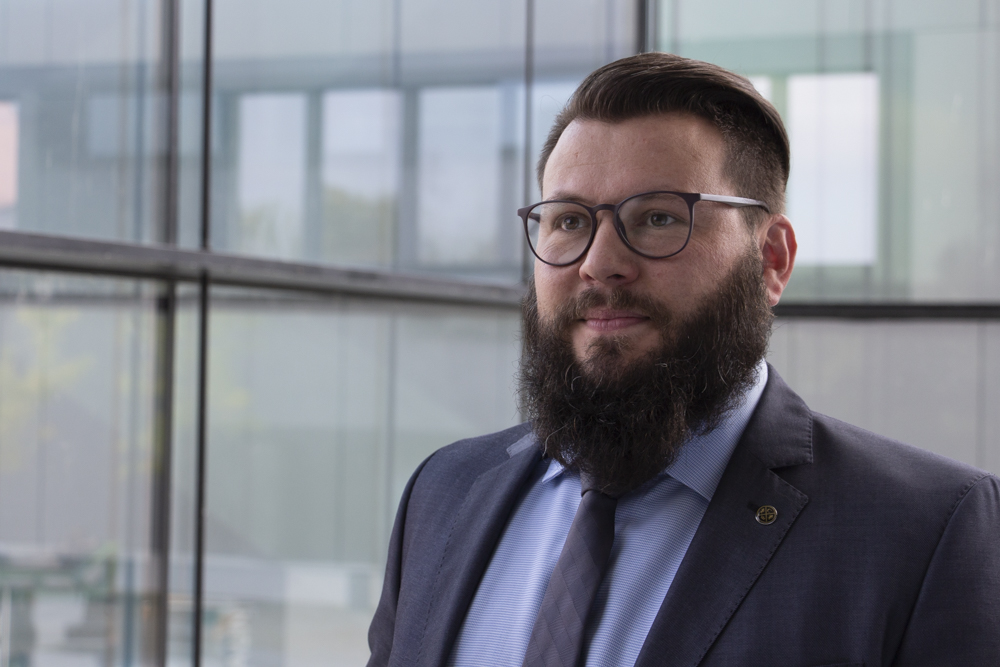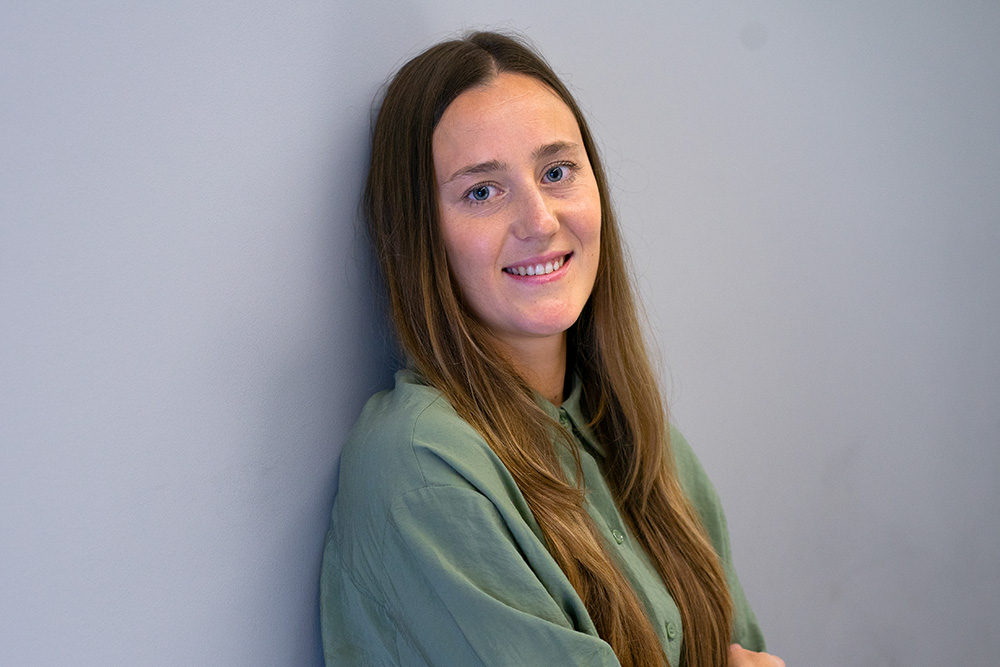The Startup Campus supports business start-ups at the university and accompanies innovative founders from the idea to the establishment of a company. We support enrolled students, employees and alumni, up to 5 years after leaving the university.
dit no. 1 worldwide in the "entrepreneurial spirit" category
wuri ranking 2023 (world's universities with real impact)
consultation
Every business formation begins with an idea. We support you from the creation of an idea to the foundation of your company. No matter what phase of the company formation you are in, we are here for you.
1. Creating an idea
At the beginning of every company there is an idea and the desire for independence. Both are the starting point for your future success. We support you from the idea to the concept creation.
2. Planning
Planning is the most important part. The development of all elements of your business model is the focus. Let us support you in this. Either from the beginning or in between.
3. Financing
Financing is probably the step where most business start-ups fail. We support you and show you the possibilities of financial support.
4. Foundation
Once your business plan has been drawn up and financing has been secured, you can get down to business. We will be at your side as well. The adventure of self-employment can begin.
Our founder's guide with its 5 phases was developed to give you as a founder an overview of the next steps towards self-employment. A recommendation to you!

Feel free to contact us at any time: startupcampus@th-deg.de
You can also drop by our Startup Lab (Veilchengasse 2, 2nd floor).
events
regular events
GROW Gründerwerkstatt
1-week seminar, always at the end of September (creditable as AWP subject)
In this joint project with the Hans Lindner Foundation, you have the opportunity to independently develop a business model using a business simulation game. Together in a team, you will work intensively on your own business idea and also learn how to generate, evaluate and further develop business ideas from trends. (no previous knowledge required)
GROW Gründerakademie
1-week seminar, always in March (can be credited as AWP subject)
At the GROW GründerAkademie you have the opportunity to learn how to start or take over a company and be successful with it. The project of the Hans Lindner Foundation is not only supported by first-class speakers from the business world, but also attaches great importance to a wide-ranging, topic-relevant programme. The contents include, for example, protecting business ideas and securing them legally, online marketing, insurance and taxes, as well as practical reports from business founders. (no previous knowledge required)
Gründerstammtisch
Every last Thursday of the month, starting at 6 pm
At the Founders' Round Table you have the opportunity to exchange ideas with the Startup Campus start-up teams in a relaxed atmosphere. We cordially invite you to join us in the Startup Lab! (Veilchengasse 2, 2nd floor)
Alumni Startup Talks
Approx. 3 to 4 talks per semester, usually on Thursdays, 6 - 7 pm
At the Alumni Startup Talks, former DIT students talk about their successes and experiences in their self-employment. The series of events takes place regularly during the semester and is organised by the DIT Startup Campus in cooperation with DIT Alumni.
Practical Workshops - Explore the World of Digital Technologies
Approx. 5 to 6 workshops per semester, usually on Wednesdays
New digital technologies are drivers of many startups. That's why the Startup Campus offers a series of practical workshops where you can interactively explore digital technologies. In this way, you can easily familiarise yourself with the subject matter and immerse yourself in the world of digital technologies. The workshops are free of charge. All university members can take part. The workshops are held in groups. (no previous knowledge required)
Gründertag
Every year in November
The Founders' Day takes place every year as part of the Founders' Week Germany. The aim of the event is to inspire young people to think and act entrepreneurially. At the annual Founders' Day, you can expect idea pitches from selected start-up teams as well as exciting keynotes from successful founders, and much more.
start-up lab
Not only the Start-Up Campus team, but also the founders can use the office space, the co-working space and the seminar room. A particularly creative working environment has been created. The Start-Up Lab is open to everyone and accessible for a visit for exchange. Everyone is welcome!
Do you have an idea for your own startup? Then come and visit us in the Start-Up Lab! (Veilchengasse 2, 2nd floor)

Booking seminar room (Veilchengasse 2, 2.33)
To book the seminar room, simply send an e-mail to startupcampus@th-deg.de
funding programmes
kickstart teams
who is currently receiving funding:
Idea: With a shortage of skilled labour and a better work-life balance, we are facing two major changes in everyday working life that will inevitably require more productive employees in order to remain efficient. The root of greater productivity lies in good planning, and 2DAY is the perfect tool for this: A calendar that does some of the planning for you. With the help of dynamic planning, tasks are scheduled into your calendar according to priority and the time required. This prevents tasks from being forgotten according to the motto "out of sight, out of mind", and idle time between appointments can be reduced or planned. With useful collaboration features, we also ensure smooth collaboration between teams and third parties.
Team: Marius Gmeinwieser
Starting date: 01.10.2023
Idea: We use modern Industry 4.0 technologies to modernise supermarket branches. Using AI-based object recognition, we make traditional checkouts obsolete, open up new ways of communicating with customers and finally enable smart, digital management of your store processes. This relieves the burden on customers, employees and management. At the same time, we implement our technology in such a way that no customer is excluded from using the shop.
Team: Hagen Lenz, Phillip Graf, Svenja Pilmeier
Starting date: 01.11.2023
Idea: Digitalisation has affected almost all areas of our lives, but the real estate sector still poses a challenge. How can a property be experienced digitally in a realistic and authentic way? This is exactly where we come in. Our aim is to reshape the way people interact with property in a digital context. Our technology is designed to enable virtual property viewings - as if you were actually there. The potential extends far beyond property agents. Whether interior designers, property developers, property managers or operators of hotels and holiday flats - anyone who is directly involved in real estate can benefit from our concept.
Team: Paul Behnke, Daniel Binsmaier
Entry date: 01.12.2023
kickstart alumni
Idee: Die Energiewende stellt uns aktuell vor große Herausforderungen wie z. B. flukturierende Energieträger oder Netzüberlastung durch PV- und Windanlagen. Der Klimawandel erfordert eine grundlegende Umstellung der Energieversorgung in allen Bereichen. Mit unserem ecoTrailer stellen wir eine ortsunabhängige Stromversorgung aus erneuerbarer Energie zur Verfügung. Durch die Entwicklung eines innovativen Batteriemanagementsystems und die Verwendung von second-life Batterien, wird der ecoTrailer nachhaltig und kosteneffizient. Die Kapazität und die Leistung des ecoTrailers sind skalierbar, sodass sowohl eine Anwendung als netzunabhängige Stromversorgung, z.B. als Baustellenversorgung, als auch eine Verwendung als Großspeicher für PV-Parks zum Peak-Shaving möglich ist. Mit seiner großen Auswahl an Schnittstellen kann der ecoTrailer an unterschiedlichen, bestehenden Systemen, wie z. B. öffentliche Ladesäulen, PV-Parks, Windanlagen oder an das Hausnetz flexibel angebunden werden. Ein intelligentes, cloud-basiertes Monitoring ermöglicht die Steuerung und Überwachung per Fernzugriff.
Team: Michael Glashauser, Lukas Holzinger, Andreas Glashauser
Eintrittsdatum: 15.09.2022
Idee: Wir nutzen moderne Industrie 4.0 Technologien, um Supermarktfilialen zu modernisieren. Mittels AI basierter Objekterkennung machen wir traditionelle Kassen obsolet, eröffnen neue Wege der Kundenkommunikation, und ermöglichen endlich smartes, digitales Management ihrer Filialprozesse. Dies entlastet Kunden, Mitarbeiter und Management. Gleichzeitig implementieren wir unsere Technologie so, dass kein Kunde von der Nutzung des Ladens ausgeschlossen wird.
Team: Hagen Lenz, Phillip Graf, Svenja Pilmeier
Eintrittsdatum: 01.11.2023
Idee: Im Sommer zu heiß, im Winter zu kalt. Selten ist die Temperatur angenehm. Doch dies muss nun nicht mehr der Fall sein – Heizen und Kühlen per mobiler Unterlage bringt die richtige Temperatur an jeden Ort. Eine Innovation, die vielen Haustieren den Alltag erleichtern wird.
Wir sind das Geschwister-Team TiMa und entwickeln eine elektrisch heiz- und kühlbare Unterlage/Körbchen für Heimtiere. Gleichzusetzen ist dieses Projekt mit der komfortablen Sitzheizung und - klimatisierung eines PKW´s.
Die Bedienung der TiMa ist sowohl an der Unterlage selbst als auch per mobiler App möglich.
Mithilfe des Kickstart Inkubators wollen wir einen, in vollem Umfang funktionierenden Prototypen der Unterlage sowie eine benutzerfreundliche und leicht verständliche App zur Steuerung entwickeln.
Team: Johanna Zech, Martin Zech
Eintrittsdatum: 15.07.2022
Idea: Every day, millions of people use various means of transportation to get from point A to point B. However, this creates several problems that need to be addressed. Inefficient route planning results in the emission of avoidable greenhouse gases, which lead to increased environmental pollution. Furthermore, each transport operator provides its own booking platform, which makes collective booking of different means of transport for a trip massively more difficult.
To innovatively transform these problems and thus the travel market, we, the team at Plant My Trip, are developing a transportation search engine that calculates the most environmentally friendly travel route by intelligently combining all modes of transportation. To pay for the greenhouse gases that cannot be saved, there is also the possibility to create a transparent CO2 offset with an ECO partner of Plant My Trip, which further mitigates the environmental impact created.
To generate a flexible platform for the customer, the search engine was developed as an app for mobile devices. The app can also be used to simultaneously book all required means of transport and CO2 offsetting. This creates a holistic solution for passenger transportation that has a positive effect on the environment and for customers.
Team: Akshita Agarwal, Ledia Leka, Timon Huber
Entry date: 1 March 2022
Idea: With our plantable picture frame, we have developed a space-saving and beautiful design object that gives you the feeling of creating your own little oasis. We offer the frame as a DIY hobby project, which convinces all plant lovers and creative minds with its design and reusability. At the same time, we pay attention to sustainable production. Due to the space-saving function, you can make the dream of a herb garden possible even in small flats.
Team: Merle Balk, Lea Burger, Louisa Höpfner
Entry date: 1 July 2022
Idea: A normal combine harvester is currently used in the agricultural sector for harvesting industrial hemp. However, the industrial hemp is not harvested as gently as with our technology.
We have developed our own hydraulic front loader attachment for tractors specifically for harvesting the flowers and seeds of industrial hemp in a single process.
The gentle, innovative harvesting process works on the principle of combing. This involves tearing or stripping the flowers and seeds from the stalks. This is achieved by applying pressure to the crop and holding it in place while the combing drum brushes through the crop.
As part of the Kickstart Incubator, the existing prototype can be further developed so that it can be brought to market to make work easier for farmers.
Team: Philipp Flierl, Jonas Schreindl, Nina Müller
Date of entry: 15.04.2022
Idea: Squadron helps solar parks achieve their optimal performance. It uses drones equipped with a gimbal control system to automatically adjust the vertical and horizontal angle of the compact high-resolution dual camera. A real-time image processing application is integrated in the control system to obtain high-quality radiometric images with accurate frames for PV modules. Thus, it is possible to detect all kinds of anomalies in the shortest time and with more precise results than with conventional inspection methods. An inspection with the Squadron drone creates a detailed overview of the solar farms, including energy and financial losses, localisation of all types of faults combined with digital twin technology to prioritise and facilitate access to all types of faults.
Team: Mohammed Abu Rezeq
Entry date: 1 July 2021
Fleischi on the road:
Squadron.
Idea: A constant companion that helps to manage the flood of information in everyday life. SpreadIt - the next generation note app - is designed to make this possible. Starting with the capture of a note, the AI-supported processing of additional information, the recording is analysed and stored in a meaningful and useful way for further processing. In the process, important annotations such as people, events, products or dates are automatically recognised and linked to each other or duplicates are identified. In addition, the note snippets are sorted and grouped using keywords. If desired, information can be shared within an organisation. In this way, a network of knowledge is created together, whereby everyone benefits and can make their contribution. The note app for an individual becomes a knowledge management system for the whole organisation step by step.
A tool to build up a realistic knowledge landscape in a sustainable way - for oneself and in the team.
Team: Johannes Zitzelsberger, Maximilian Stegbauer, Matthias Kilger
Entry date: 27 May 2021
Idea: Climate change is advancing and leading to a massive expansion of renewable energies globally. In Germany in particular, national climate targets are leading to increased decentralised renewable power plant concepts and a reduction in primary energy consumption. This necessary energy transition is leading to an increase in electricity applications. However, Germany has the highest (grid) electricity price for private households worldwide. Economically more lucrative decentralised power plant concepts are leading to an increase in private power plant operators, such as photovoltaic systems. This cheap local electricity is displacing expensive grid electricity.
Tradenergy uses software as an app to ensure that local electricity can be traded in a decentralised manner that is legally and technically secure. The tenant electricity model provides the basis. Surplus energy can thus be sold to third parties. The (future) decentralised electricity grid structure coupled with the increasing degree of electrification and expiring feed-in tariffs make this application inevitable.
Team: Anton Dobler, Andreas Lindlbauer, Anton Kirchner
Entry date: 23 August 2021
Idea: OmnitorQ focuses on improvements to hand tools. Many tools have already undergone the transformation from ordinary purely mechanical tools to engineered solutions. One example is the evolution of the screwdriver into a cordless screwdriver. But not every hand tool has an engineered solution that supports the user in their work. That is why OmnitorQ concentrates on finding solutions for these tools. First, the start-up focuses on the functional principle of the open-ended spanner. The aim is to provide existing advantages of the tool with innovative technical solutions in order to achieve an increase in efficiency in the work to be carried out.
Team: Korbinian Miller, Prashant Viradiya
Entry Date: 18 March 2021
Idea: For immigrants and foreigners, it is very difficult and expensive to source their local products in Germany. Therefore, KulturCart is developing an e-commerce market for African, Asian and Latin American food and local products. Consumers can thus buy local products quickly, easier and cheaper. However, KulturCart is not only an online shop, but offers the possibility to get to know different cultures and provides information accordingly. The mission of Kulturcart is to create multiculturalism and diversity in Germany by giving everyone quick and easy access to international cuisine and information about cultures from all over the world.
Team: Ibrahim Lawal, Hilda Tabitha, Ahmed Adeagbo, Austin Sade
Entry date: 26 May 2021
Idea: TC3D has developed a process in additive manufacturing to produce coloured parts. More precisely, FFF 3D printing is combined with transfer printing in such a way that high-resolution images are transferred to one side of the components. Currently, 3D printers that can print in colour are still expensive and very limited in FFF printers. In this area, the only options are to use several coloured filaments in succession or to colour each layer with an inkjet print head. Special transfer ribbons now offer an alternative. Software combines the G-code (file for the 3D printer) with an image file and prints a toner layer on the transfer foil using a laser printer. This is then fixed on the heating bed of the 3D printer and the part is built up on the transfer foil. The toner is transferred from the foil to the polymer during the printing process. After cleaning the foil, it can be reused. The process has applications in the hobby sector and in industry.
Team: Daniel Winklmaier Peran, Johannes Zillner, Jonas Scherz and Simon Böhmisch
Entry date: 06 April 2021
Idea: XR|eality develops software application in the field of virtual reality and augmented reality in order to digitise teaching as a whole in a sustainable and steady way. Since 2020, the education system has been forcibly digitalised due to the Corona pandemic. One thing has always been certain: EdTech and the modification of many learning processes are of utmost importance for the teaching of the future. First of all, the start-up aims that its software, which is developed with Unity, will soon be found at universities.
Examples of the above-mentioned software applications are geographical explorations through numerous terrains or a planetarium to observe physical processes in our universe at close range. Working with geometric solids also lends itself to schools in the subject of mathematics. Pupils and students can thus immerse themselves in a virtual educational environment and experience learning in a new way.
Team: Christoph Pauli, Silvio Angelillo
Entry date: 27 May 2021
Idea: The idea for Bison arose during the construction of the house, where socket connections often had to be laboriously separated due to corrections when laying KG pipes. An employee of the construction company complained that so far no tool has been offered for this constantly occurring problem. Bison is a simple tool with which even difficult-to-separate socket joints can be loosened quickly and safely by skilful, even distribution of force without damaging the pipes as well as the sockets. Bison saves time and energy for private users as well as considerable labour costs for companies.
Team: Franz Raumschüssel, Hermann Seidl
Entry date: 17 June 2021
Idea: Old machines often function perfectly, but their process cannot currently be digitally recorded and evaluated. About 85% of all processing machines currently in use (worldwide) are not able to provide operating states, machine parameters or processing information digitally.
For this reason, we - the MDE-Box team - are developing a new retrofit solution to digitally record and process machine data from existing machines in production. This data is generated via image signals of a graphical user interface, without retrofitting sensors. This enables machine data storage and analysis without intervening in the machine's hardware and/or software. The generated data is transferred to a database and transmitted via an online standard interface (e.g. OPC-UA) to the company's process control system (e.g. ERP, MES systems).
The recorded data allow, for example, conclusions to be drawn about the overall equipment effectiveness (OEE), downtimes, tool use and wear and the machining status. Thus, the entire machining/manufacturing process can be digitally mapped, interpreted and improved. Based on their own production data, this enables companies to better utilise their equipment and plan their processes. With our solution, companies can realise optimisation potential and increase the effectiveness of their production facilities in the long term.
Team: Till Bienlein, Felix Weggenmann, Ali Aljalali
Duration: 01 December 2020 - 21 May 2021
Idea: Scob develops a platform where pupils can find orientation and discover interesting companies. We connect these two parties in an efficient ways and can therefore provide companies with suitable potential trainees who, through sufficient information, make an informed decision and thus provide the company with long-term, motivated added value. Scob distinguishes itself from other online offers through its innovative approach to career orientation using orientation tests and the visualisation of companies in a three-dimensional world, thus ensuring the best possible and manageable information on the student side and a solid presentation of the company on the company side. The orientation tests are implemented with the help of a neural network, which is an approach that does not yet exist on our market. We develop the three-dimensional professional world with Unity (a software for visualisation in three-dimensional space). Such a professional world does not yet exist.
Team: Maximilian Hau, Maximilian Anzinger, Sebastian Hau
Duration: 1 September 2020 - 28 February 2021
Idea: in the project a 360° video drone is being developed, whereby the drone itself is not visible in the video material. This drone is specially designed for indoor shots. Due to its small size (LxWxH approx. 20x20x5 cm) and its equally low weight of less than 250g, it is able to fly through small openings, windows or shelves on the one hand, and over sensitive places close to people without any problems on the other hand. This opens up completely new perspectives, as at indoor sports events you can fly past the athletes very closely and with outstanding agility and speed, or at dance events you can even fly between the feet of the dancers. Due to its size and inertia, such shots are currently not possible with other 360° drones (e.g. www.spherie.com) and make the project unique. In addition, as the 250g limit in Germany is no longer legally required for the model aircraft to fly in the field of vision, i.e. the pilot is no longer visible on the photographs, which offers the potential for new types of user experiences
Team: Daniel Fuchs
Duration: 1 August 2020 - 31 January 2021
exist teams
exist alumni
Idea: Scob develops a platform on which students can orient themselves and discover interesting companies. We connect these two parties in an efficient way and can thus provide companies with suitable potential trainees who, through sufficient education, make an informed decision and thus provide the company with long-term and motivated added value. Scob distinguishes itself from other online offers through the innovative approach of career orientation with the help of orientation tests and the visualization of the companies in a three-dimensional world and thus ensures the best possible and manageable clarification on the student side as well as a solid presentation of the company on the company side. The orientation tests are implemented with the help of a neural network, which is an approach that does not yet exist on our market. We develop the three-dimensional professional world using Unity (a software for visualization in three-dimensional space). Such a professional world does not exist yet.
Team: Maximilian Hau, Maximilian Anzinger, Sebastian Hau
Mentor: Prof. Dr. Patrick Glauner
Funding: EXIST-Gründerstipendium, September 2021
You can find more information in the InformaApp.
Idea: In cooperation with the Application Laboratory Industry 4.0 of the Deggendorf Institute of Technology, ti4f has developed a strategy to digitalise the processes in tool and mould making. The processes of the highly complex one-off production can be analysed with the help of the Process Explorer and process bottlenecks can be detected. With the help of the self-learning knowledge database working in the background, strategies for process optimisation can be generated. The learning management system is intended to provide customers with digital process knowledge at the right time in order to be able to network the process across departmental boundaries. Since digitalisation can only be implemented at a slower pace without support, ti4f provides a moderated online community.
Team: Constantin Vogel, Thomas Brunner, Radoslaw Korek
Mentor: Prof. Dr.-Ing. Ludwig Gansauge
Funding: EXIST-Gründerstipendium, October 2020
You can find more information in the InformaApp.
Idea: The founding team has the vision of using the potential of agricultural robotics to strengthen a local and thus sustainable food supply. Their initial product, the vegetable cultivation robot "SEPP", is initially intended for home use. It takes over the work steps "irrigation" and "weed control" necessary for vegetable cultivation, for which there is often no time or motivation. Through continuous care of the vegetable patch, he thus ensures the success of the harvest all year round.
Team: Andreas Stockinger, Martin Seidl, Sandra Eichenseher
Mentor: Prof. Dr. Wolfgang Dorner
Funding: EXIST-Gründerstipendium, August 2020
You can find more information in the InformaApp.
Idea: XENTEC stands for the highest security and performance in the storage and communication of information. The specially developed encryption system offers the highest security standard in the age of digitalisation and Industry 4.0. Intelligent marketplace for manufacturing parts. Here, the customers of the manufacturing companies create tenders to which the manufacturing companies can bid directly in the platform.
Team: Sebastian Schreiner, Nicolai Roider
Mentor: Prof. Dr. Thomas Geiß
Funding: EXIST-Gründerstipendium, April 2020
Further information can be found in the InformaApp.
Idee: Lumoo is a platform for everyone aged 50 and over, all about the internet, networking and new media. The app consists of two parts: Lumoo Explain, as an e-learning application, offers a way to get started with digitalisation and the internet. Lumoo Connect to network and find new friends on an interest basis.
Team: Juliane Schwabenbauer, Uta Maier, Andreas Hell
Mentor: Prof. Dr. Thomas Geiß
Funding: EXIST-Gründerstipendium, November 2019 (extension until the end of Januar 2021)
Further information can be found in the InformaApp.
Idee: Innovative safety binding in water sports - with the patent-pending mechanism of the Dalion safety binding, injuries in the one-footer area are radically reduced or avoided. A further development of the product can be described as a smart safety binding, which intelligently controls and individualises numerous functions via digital sensors and, in addition to injury prevention, also enables an increase in performance. In addition, it allows the user to evaluate personal riding data and get an overview of the route, altitude and tricks.
Team: Markus Zaglmann, Thomas Lischke
Mentor: Prof. Dr. Thomas Geiß
Funding: EXIST-Gründerstipendium, November 2019 (extension until the end of December 2020)
Further information can be found in the InformaApp.
Idea: Intelligent marketplace for production parts. This is where the customers of the manufacturing companies create invitations to tender, which the manufacturing companies can then offer directly in the platform.
Team: Robert Hilmer, Sebastian Freund, Michael Neuhauser
Mentor: Prof. Dr.-Ing. Herbert Fischer
Funding: EXIST Funding scholarship, March 2019
Idea: A company that develops solar seawater desalination plants in cooperation with the customer and implements them worldwide.
Team: Niclas Dehmel, Dimtrij Medvedev, Raphael Wagensonner
Mentor: Prof. Dr.-Ing. Robert Mnich
Funding: Exist-Gründerstipendium, May 2018
Idea: Algorithm used to create stories based on random variables.
Team: Johannes Pfister, Jacqueline Pfeifer und Sascha Kath
Mentor: Prof. Susanne Krebs
Funding: Exist-Gründerstipendium, January 2018
Idea: HYYV is a trustworthy, innovative app-based B2C interaction platform for companies and their existing and potential customers. The novel combination of network, messenger and mobile wallet solves problems of both parties and closes the gap of existing interaction possibilities.
Team: Florian Oberhofer, Robert Maier
Mentor: Prof. Dr. Johann Nagengast
Funding: Exist-Gründerstipendium, September 2017
Idea: App and platform for the prevention and processing of wildlife accidents.
Team: Alfons Weinzierl, Alexander Böckl, Jozo Lagetar
Mentor: Prof. Dr. Wolfgang Dorner
Funding: Exist-Gründerstipendium, November 2016 & Start?Zuschuss!, November 2017
Idea: Sminks is a payment app for mobile devices that seamlessly links payment functionality and value-added services.
Team: Lisa Erdmann, Martin Schlott, Magdalena Lerchl
Mentor: Prof. Dr. Götz Winterfeldt
Funding: Exist-Gründerstipendium, April 2014
Idea: Media Disposition
Team: Markus Baun, Bernd Meyer, Ben Kose
Mentor: Prof. Dr. Götz Winterfeldt
Funding: Exist-Gründerstipendium, February 2013
Idea: Tool for manufacturers that compares prices to detect price competition and react appropriately to negative price spirals before the product sales margin is destroyed.
Team: Matthias Lange, Lohmanns Nana, Alexander Thomas
Mentor: Prof. Dr.-Ing. Josef Schneeberger
Funding: Exist-Gründerstipendium, January 2012
Idea: Development of a multi-copter with remote head for high-quality film recordings in HD quality.
Team: Florian Schlamminger, Tobias Oberberger
Mentor: Prof. Dr.-Ing. Udo Garmann
Funding: Exist-Gründerstipendium, April 2011
Idea: Development of an integrated workflow management system (WVMS) for the fast administration, transmission and editing of video files for professional film shooting.
Team: Benedikt Meirer, Yannic Hieber, Huy Truong
Mentor: Prof. Ernst Jürgens
Funding: Exist-Gründerstipendium, January 2011
Idea: Development of an intelligent mountain rescue system based on pattern recognition algorithms.
Team:
Mentor: Dr. Jutta Hübscher
Funding: Exist-Gründerstipendium, July 2010
Idea: The development of a web-based platform for learning and applying brain-friendly learning techniques based on mnemonics.
Team:
Mentor: Prof. Dr. Dr. Heribert Popp
Funding: Exist-Gründerstipendium, March 2010
flügge teams
FLÜGGE Alumni
Idea: Fresh vegetables from one's own garden have many advantages, but taking care of the vegetable patch always requires an immense amount of time. The start-up SEPP has the vision of creating a self-sufficient garden in which the time you can or want to spend is no longer the limiting factor for the harvest quantity. The vegetable garden robot SEPP (Smart Efficient Plant Production) takes over the work steps "watering" and "weeding" necessary for vegetable cultivation, for which there is often no time or motivation. The dream of having your own vegetable garden is therefore no longer a question of time.
Team: Andreas Stockinger, Kim Hong, Korbinian Miller
Mentor: Prof. Dr. Wolfgang Dorner
Funding: FLÜGGE, 1 March 2022 - 28 February 2023
You can find more information in the InformaApp.
Fleischi unterwegs:
Sepp.
achievements
achievements startup-teams:
Career captain
- 3rd place AI-Cup of the University of Passau (2022)
- 3rd place Entrepreneurship Award of the University of Passau (2022)
- Member Microsoft for Startups Founders Hub
mde-box
- 3rd place BayStartup Businessplan Competition Ideenreich (2022)
ti4f
- 1st place Startup Challenge 2021 at the Technology Campus Parsberg-Lupburg
sminks
- 1st place BayStartup ideenReich Business Plan Competition 2015
wuidi
- 1st place BayStartup ideenReich Business Plan Competition 2016
- German Mobility Award 2017
- Generation-D Competition 2017
- Innovation Award - Special Founder Award 2017
rollatec
- 1st place BayStartup ideenReich Business Plan Competition 2018
aquaba
- 3rd place Hochsprung Award 2018
easy2parts
- 2nd place BayStartup ideenReich Business Plan Competition 2020
- Seed financing (Business Angels + Family Office + Bayern Kapital)
- Niederbayerischer Founder Award 2023 in the category Concept
- TOP Newcomer 2022 from Landkreis Deggendorf
innospot
- Top 10 start-ups in Germany (German Start-up Award)
- Acquisition of HYPE, the world's leading provider of innovation and idea management software
quimedo
- 2nd place BayStartup ideenReich Business Plan Competition 2021
dalion
- Award at the international competition ISPO Brandnew Selection 2020 Offshore
- International patent application (PCT) already filed
awards achieved by dit in entrepreneurship:
DIT is internationally recognised with an award of excellence:
WURI (Worlds Universities with Real Impact) ranked DIT No. 1 worldwide in the category “Entrepreneurial Spirit“ 2023.
National awards for DIT:
The university ranked first in Germany in the "medium-sized universities" size category in the Founders' Radar 2022 by the Stifteverband.
Overall ranking: 10th place
Results in the categories:
Foundation anchoring: 10th place
Start-up awareness: 4th place
Start-up support: 3rd place
partners
In order to support you and your business ideas, we are not alone. We have strong partners on our side.
hans lindner foundation
Die Hans Lindner Foundation is a non-profit foundation of the Lindner family and the Lindner Group.
The focus of the consultation for founders of new businesses, company successors and entrepreneurs is the success that you as a person want to achieve in your independence. It supports you in realistically defining your requirements, needs and wishes and helps you with experience in implementing them.
innovations technology campus (itc1)
technology oriented business park and digital incubator
A hub for companies and start-ups
Industrial Park
The Innovations Technology Campus is a technology-oriented business park and start-up campus offering variable and multifunctional rental space on 12,400 m².
Start-Up Centre
The ITC1 is an incubator in Deggendorf and offers a place for idea carriers, start-ups and young companies to realise their ideas and goals.
Network & Events
At ITC1, founders, start-ups and young companies meet already established high-tech firms. They also find access to a broadly structured and cross-sector network. A large number of practice-oriented events and workshops are offered on site and virtually.
digital business incubator. rottal-inn freyung-grafenau (greg)
The cross-border business incubator with its locations in Pfarrkirchen and Freyung is the contact point for start-ups and female start-ups in the rural area of Lower Bavaria. As part of the Lower Bavarian Digitalisation Start-up Centre Network (GZDN), we support start-up projects with a digital connection and network start-ups supraregionally in the border regions of Austria and the Czech Republic.
#GRÜNDENIMGRÜNEN means attractive office and coworking space in a central location and natural environment, a wide range of consulting and further education opportunities, exchange with like-minded people and valuable contact points to sponsors and business partners.
digital. innovative. founder. centres. (igz)
County of Cham
The Innovation and Start-Up Centre Roding provides perfect starting conditions and future prospects for business start-ups. Thus, the IGZ offers those willing to set up a business an optimal basis for their business start-up and strengthens the small and medium-sized business base in the district in the long term.
Flexible premises, jointly usable services, support in arranging contacts and in the development of subsidies as well as the spatial proximity to likewise innovative founders of new businesses should improve the starting chances of the companies located in the IGZ.
The innovation and start-up centres in the district of Cham offer optimal starting conditions for innovative start-ups. Full concentration on entrepreneurial tasks, an excellent environment, services and support are the central benefits for the resident companies.
qualifying courses
The various qualification programmes offered by the Deggendorf Institute of Technology support you in your project. In this way you will be perfectly trained for your path to entrepreneurship.
This program for ambitious entrepreneurs is structured to turn vision into business by implementing the Silicon Valley marketing spirit.
See the Further Education section for course details.
As a student of the Deggendorf Institute of Technology, you have the opportunity to learn how to found or take over a company and succeed as such. In addition, the seminar week can be credited as an AWP subject (2 ECTS credits).
The Hans Lindner Foundation project in Deggendorf not only offers first-class speakers from the field, but also attaches great importance to a wide-ranging, topic-relevant programme. The content ranges from topics such as protecting and legally securing business ideas, to online marketing, company takeovers and practical reports from business founders.
Playfully developing start-up ideas - from idea to innovation
As students of the Deggendorf Institute of Technology, you have the opportunity to develop business models independently in a team using a business game. Furthermore, digital technology skills are taught in the form of learning labs, which can be experienced in groups in a playful way. In addition, the project week can be credited as an AWP subject (2 ECTS credits).
In this project of the Hans Lindner Foundation and the DIT Startup Campus, students work intensively on their own business idea and also learn how to generate, evaluate and further develop business ideas from trends.
The GROW GründerWerkstatt focuses on the central elements of start-up and innovatoin processes and is intended to map the overall connections from the idea to innovation (No previous knowledge necessary!)
Uber, Slack, Whatsapp, ... big names that started as small start-ups in recent years and were all founded by engineers and computer scientists. Technology, product, business model and the founding team are all closely linked.
Can this success also be planned?
In this elective, we take you step-by-step through the phases of founding a company:
- Idea generation
- Business model development
- Prototyping
- Planning
These aspects of setting up a business are explained theoretically in the course of the implementation in order to put the new knowledge into practice in a team on their own start-up idea.
Note: This AWP/FWP subject is not offered every semester
start-ups
successful start-ups
Many students have already dared to take the step into self-employment. We will gladly mediate between you. You will have a contact person who can tell you about his or her own experiences.
You are a graduate at DIT and have founded your own company? With the DIT Spin-Off Label you can show which university you come from! All important information about placing the Spin-Off Label on your website can be found in the guidelines.
If you have any questions please contact the Startup Campus via startupcampus@th-deg.de.
news

At the beginning of June, the international founding team "future-link" from the Startup Campus of the Deggendorf Institute of Technology (DIT) received an EXIST startup grant of €131,500 for their idea of a retrofit solution for easy machine data collection.
The young founders—Shivam Parmar (India), Ali Aljalali (Syria), and Johannes Bardon (Germany) got to know each other at DIT and have set themselves the goal of offering companies a manufacturer-independent plug-and-play retrofit solution for recording machine data. This should then be able to be used for fully automated process monitoring of machinery. Since older machines often lack the necessary interfaces for data extraction, future-link is developing a product using DIT's patented "Method and System for Machine Data Collection" (DE102019101132). This product enables uncomplicated machine data collection (MDE) without external sensors or existing interfaces. Additionally, the startup offers operational data collection (BDE), which, when combined with MDE, provides a comprehensive overview of the production process. To ensure information security, the data traffic of the system, which runs on Raspberry Pi and Windows, can operate within a completely independent network, separate from the manufacturing operation.
Having moved into the Startup Lab in Veilchengasse, Deggendorf, the three founders now have twelve months to turn their prototype into a market-ready product. Concurrently, they are also working on expanding their business model.
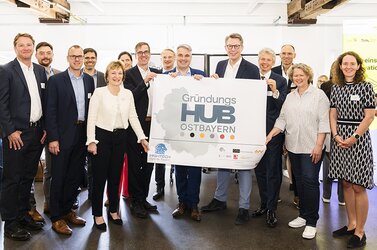
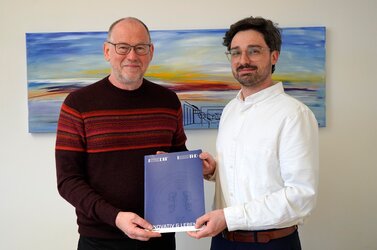
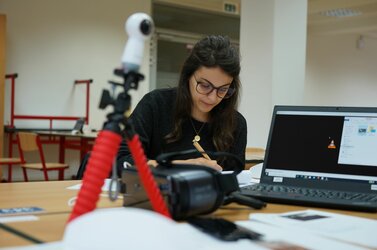
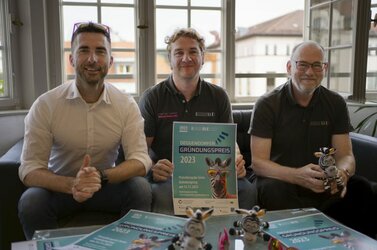
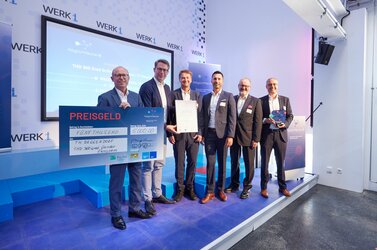
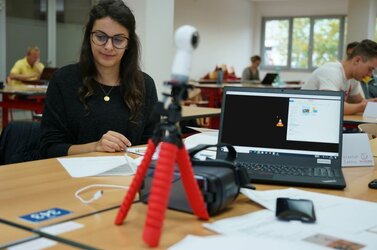
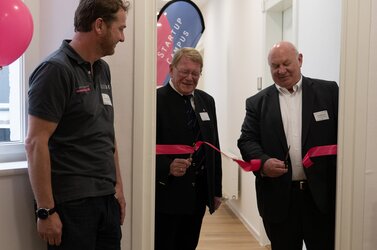
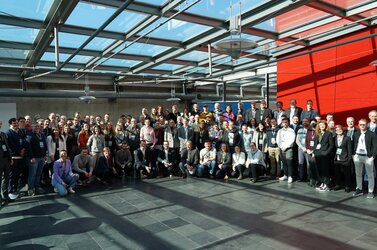
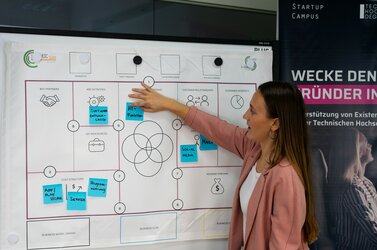
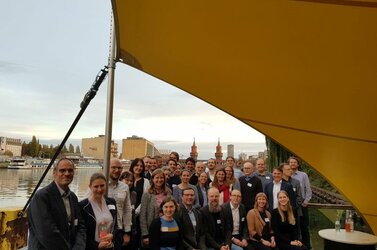

The evening lecture hall was packed with well over 100 participants from start-ups, students, political representatives and regional companies, delicious cappucino beforehand and pizza for everyone at the end. In between, a firework of great ideas from young founders. The 7th Start-up Day of the Startup Campus of the Deggendorf Institute of Technology (DIT), ITC1 Deggendorf and the Hans Lindner Foundation, which took place on 16 November on the DIT campus, was as successful as one could wish for. An evening you won't forget in a while.
Framed by a keynote speech by the well-known Munich start-up "happybrush" and a small panel discussion with the local heroes from "TI4F", a total of six start-ups pitched and battled each other for the favour of the curious audience. All business ideas had to be explained in a maximum of three minutes. Not so easy, given the sometimes complex and offbeat topics. The many questions from the audience reflected not only the great interest, but also the powerful impression all the pitches had made.
The team "wherehouse" presented a mobile phone app that even small companies can use to get a quick overview of their stock of C-parts, i.e. small things like screws or dowels, with just a few clicks. "Plant my Trip" then showed how artificial intelligence (AI) can be used to optimise the routes to and from the workplace as well as reduce costs for the workforce and cut CO2 emissions. Things were a bit bigger at "SHT", which is already very successfully working on a harvesting machine for commercial hemp. This project also showed what options the rural area offers and what would be difficult to develop in an urban environment. "Career Captain", the eventual winners of this challenge at the Start-up Day, explained their digital replica of workplaces so that interested people can get an exact image of what to expect in their future job while they are still applying. The sorting of Lego parts is taken care of by "reBricker". And who doesn't know the vast quantities of individual Lego parts from numerous construction kits lying around in the cellar or attic. The AI-based sorting machine from "reBricker" recognises each individual part and sorts them back into their original sets at the end. And of course, the topic of gaming was not to be missed. Here, "5 Finger Games" was at the start, which is developing a blockchain-based tactics game called "Knights of Cathena".
In addition to great company ideas, the Start-up Day also showed the strength of the associated network in and around Deggendorf. In addition to the DIT Startup Campus, there is also the Gründerzentrum Digitalisierung Niederbayern (GZDN) in ITC1 Deggendorf and the Hans Lindner Foundation. Together with the university's start-up activities, some of which are already anchored in the degree programmes, they form an ideal environment for young people who want to turn their dream of owning their own company into reality. Here you can try things out and try yourself out in a protected space. Motto: Just do it!
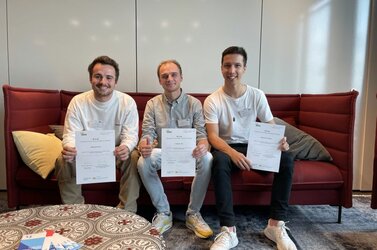
The startup "Career Captain" from Deggendorf has won a five-figure scholarship in a Bavarian-French competition in the field of artificial intelligence - up to 95,000 euros are earmarked for each of the eight best competitors. Now the founding team, which is supervised at the Deggendorf Institute of Technology (DIT), can pursue its start-up idea in the coming year. The Career Captain platform is intended to support young people in choosing a career by means of artificial intelligence (AI).
Above all, pupils should be able to find out their professional interests and get to know suitable companies via Career Captain. To do this, they have to take an orientation test that suggests suitable job profiles with the help of artificial intelligence. It is important to the founders that the platform is playful and appropriate for the target group.
The AI Cup, in which Maximilian Hau, Sebastian Hau and Maximilian Anzinger participated with Career Captain, is a Bavarian-French start-up initiative to support the next generation of AI entrepreneurs and bring forth innovative AI start-ups in Europe. This year, the University of Passau hosted the AI Cup. In the group of entrepreneurial competitors, the three founders took third place. The team started working on the platform two years ago. With the DIT Startup Campus as an advisory centre, they received an EXIST start-up grant, which expired in September. The funding from the AI Cup is important follow-on funding for the team.
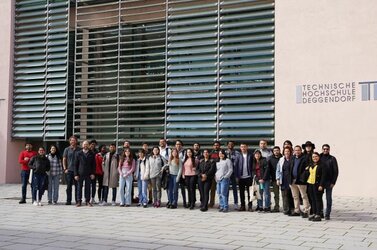
Fifteen students from the Universidad de Concepión Chile (UDEC) visited the Deggendorf Institute of Technology (DIT) for a week at the end of September. Together with DIT students from the field of energy management, they took part in the GROW4Energy Startup Summer School. The focus was on developing joint ideas and exchanging knowledge in topics such as solar, wind and hydro energy, energy from biomass and e-mobility. In addition, a long term cooperation between the UDEC and DIT was to be established and the entrepreneurial spirit in the respective regions strengthened.
In the GROW4Energy Startup Summer School, the students listened to lectures on topics in the fields of entrepreneurship, energy economics and intercultural communication and participated in workshops focusing on the development of startups and ideas. There were also panel discussions, a pitch event and excursions to regional energy companies. The GROW4Energy Startup Summer School was organised and conducted by Prof. Dr. Javier Valdes, expert in BigGeoData, and Prof. Dr. Thomas Geiß, head of the DIT Startup Campus.
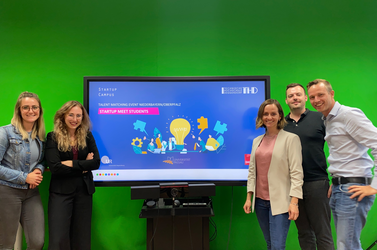
Even though it is probably assumed otherwise, it is often difficult for university start-ups to find fellow entrepreneurs to build up their business. Start-up advisors from the universities and colleges from the Deggendorf Institute of Technology, Passau, Landshut, Regensburg and Amberg-Weiden have noticed this and want to find a solution together. They see a solution in cross-university talent matching events. The first online event took place on 7 July under the motto “Startups meet students”.
The cooperation between the universities increases the chance for the start-ups to find the right team member. They can present themselves to a larger audience and meet students from even more disciplines. A total of eight selected start-up teams presented their start-up projects at the first Talent Matching Event in 3-minute pitches and then went into detail about their vacant positions. They were looking for co-founders, permanent team members, final-year students, working students or interns. Around 85 students took part in the event. After the pitches, they were able to get to know the prospective founders in small groups and in a personal atmosphere.
This time, the talent matching event was organised by the DIT Startup Campus together with the Landshut University of Applied Scienced, the University of Passau and the O/HUBs (University of Regensburg, OTH Regensburg and OTH Amberg-Weiden). All participants can imagine holding further events at each university in turn.
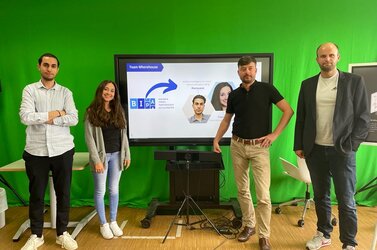
Since 2020, the Deggendorf Institute of Technology (DIT) has been a partner of the Bavaria Israel Partnership Accelerator (BIPA). The programme brings together students from Bavaria, Israel, the United Arab Emirates and companies from Bavaria. The companies assign tasks to the students, who are supposed to work out innovative solutions as an international team. Last year, students Franziska Feldbauer and Marouane Khoukh from DIT took part. Using their example, the university wants to motivate other companies and students to take part in the programme. Only a few months later, Franziska and Marouane are now working on their own start-up.
They laid the foundation for it at the company PS Cooperation, which also participated in BIPA. They gave the students the task of thinking through the topic of warehouse management and Kanban in terms of digital possibilities. Franziska and Marouane had the right profile for this - as did Neama Al-Ali from the United Arab Emirates and Tom Tsukermann and Yuval Peretz from Israel. Through the organisers of BIPA, they were selected as a team for the PS Cooperation. Josef Gutsmiedl, who works at the PS Cooperation location in Eggenfelden, was on hand to mentor the team. For him, the exchange between university and company was exciting: "The students brought "innovative spirit" with them and came up with completely new approaches." He was impressed by the excellent result that the students produced in only two months and that corresponded exactly to the company's ideas. The fact that Gutsmiedl is still in contact with Franziska and Marouane after the BIPA programme is all the more gratifying. Franziska and Marouane would like to further develop their start-up idea "WhereHouse" together with him and their mentor Prof. Dr. Wolfgang Dorner. WhereHouse is an AI-based solution for providing a digital twin for warehouses. Students and companies can participate in BIPA again this year. Companies can e-mail startupcampus@th-deg.de. Students apply online at: https://bip-accelerator.com/. The 2022 programme starts on 17 October with a workshop in Munich and ends on 14 December with a workshop and presentation of the results in Be'er Sheva.
BIPA is organised by the Deggendorf Institute of Technology, the Strascheg Center for Entrepreneurship in Munich, the OTH Regensburg, Tech7 and the Khalifa University in Abu Dhabi.
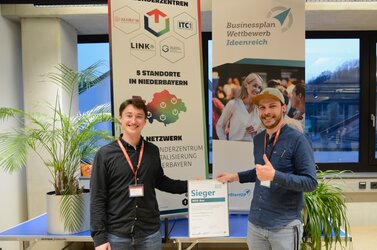
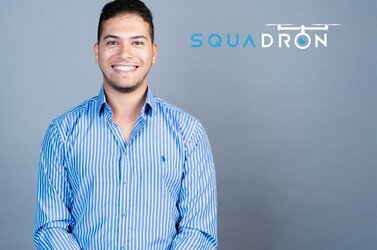
Mohammad Abu Rezeq is the first prospective founder at the Deggendorf Institute of Technology (DIT) to receive funding for his start-up idea as an international student. He wants to use a drone and artificial intelligence to facilitate the inspection of solar parks. To build the first prototype of the drone, he has now received the highest possible funding amount of € 7,500 from the Kickstart Incubator Programme.
Mohammad is studying for a Master’s degree in Electrical Engineering in Deggendorf and is originally from Jordan. With his start-up idea Squadron, he wants to help solar park operators collect data on their solar cells, which he evaluates for quality assurance with the help of artificial intelligence. Thus, compared to conventional inspection methods, it is possible to detect all kinds of anomalies in the shortest possible time and with more precise results. In July 2021, Mohammad presented his innovation to the Startup Campus team at DIT. Since then, he has been supervised and supported by the start-up advisors and his mentor Prof. Dr. Wolfgang Dorner. The start-up advisors are pleased that he Jordanian is consciously striving to found his company in Germany. This means that the added value can be felt directly. As the first international student to found a company at DIT, Mohammad would also like to take the next step and secure funding through the EXIST start-up scholarship and is currently writing an application for this.
About the Incubator Programme
The Kickstart Incubator is a programme for all prospective founder with innovative technology-oriented start-up projects or services with high customer value. After successfully presenting the idea, the first step is to develop the business model and build the founding team. Selected experts from DIT and the Startup Campus team are on hand to coach and mento the prospective founders. Free access to the StartupLab premises creates a creative working environment and enables exchange with other funding teams. With up to € 7,500 in funding per team, nothing stands in the way of building the first prototype. After completing the incubator programme, the teams are well equipped for the upcoming start-up and ready for subsequent funding such as the EXIST start-up scholarship. More information on the topic of founding can be found here: www.th-deg.de/starting-a-business
The funding is made possible by the funding measure “Entrepreneurial Thinking and Scientific Founding Spirit – Research and Founding Freedom at Universities of Applied Sciences” StartupLab@FH of the Federal Ministry of Education and Research.


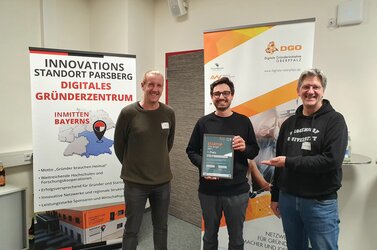
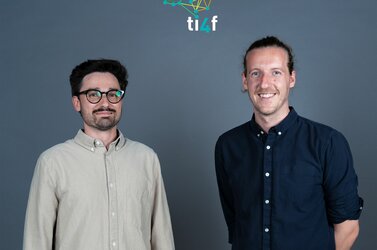
The Deggendorf Institute of Technology (DIT) supervises and supports students in various phases of the start-up process. Also when it comes to making the emerging start-ups better known and building up their network. On 27 October, the DIT Startup Campus invites you to the virtual event “meet the team”. The founding teams will each talk about their business idea for 15 minutes and then want to engage in an exchange with the audience.
Among others, the team ti4f will introduce itself. Ti4f was funded by a start-up scholarship at the Deggendorf Institute of Technology and has already founded a company. The three-member team is still looking for a strategic partner or investor, for example. Thomas Brunner, Constantin Vogel and Hamidreza Abolpourmoshizi are developing an end-to-end digitalised process chain in one-off production. The event starts on 27 October at 4 pm and takes place via Zoom. Not only students, employees and partner companies of the university can participate, but also anyone who is interested in the topic of business start-ups. Registration is possible via DIT’s seminar platform: www-th-deg.de/seminare. The zoom link will be sent out afterwards.
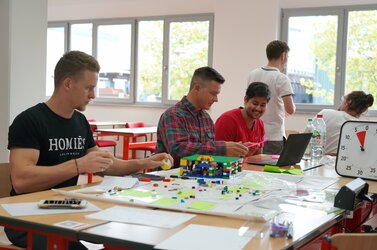
If you like the idea of owning your own company but don't quite know what the business idea could be yet, you don't have to give up on this dream right away. The Startup Campus of the Deggendorf Institute of Technology (DIT) showed how students can take the first steps towards their own startup at the GROW Startup Workshop. In the 5-day seminar at the end of September, students from different disciplines developed concepts for start-up ideas with innovation potential. The Hans Lindner Foundation and primeAcademy, which are experienced in the field of entrepreneurship, were also present.
In the theory part of the start-up workshop, the students learned how to develop their own business idea and what is important in the process. For example, assessing their own competences and those of others, which creativity techniques help and how to develop further in a team. The week of the event was then used to form teams, develop concepts and, in the end, convince an invited jury. The idea of a mechanical seawater desalination plant by the FLOAT team was the most popular. All teams that took part in the Startup Workshop have the chance to apply for the exclusive "Kickstart Incubator" funding programme. The Startup Campus is on hand to advise those interested in founding a company. They can also draw on the network of start-ups at DIT. Everyone has already met at the start-up regulars' table.
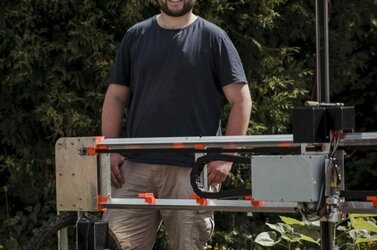
The start-up SEPP of the Deggendorf Institute of Technology (DIT) wants to conquer the market of domestic vegetable cultivation next year. SEPP farming has the vision of cultivating self-sufficient gardens with the help of a robot. It is supposed to help with watering and weeding so that the dream of having one's own vegetable garden is no longer a question of time. The team still needs reinforcement in product development (focus on software). In particular, we are looking for a co-founder with project experience. The idea of the vegetable robot will be funded by the FLÜGGE programme starting this autumn, so that the team can grow. Anyone who would like to contact the start-up can do so by e-mailing Andreas Stockinger at andreas.stockinger@th-deg.de.
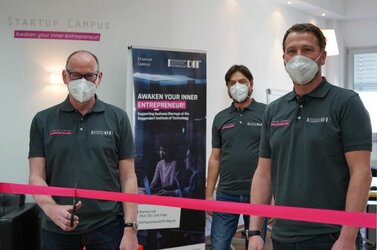
With over 300 square metres of new space in the ITC2 in Deggendorf, the Startup Campus of the Deggendorf Institute of Technology (DIT) is creating room for innovative minds who want to start their own business. An official inauguration of the Startup Lab took place digitally on 28 April. Here, all network partners of the Startup Campus as well as DIT employees had the opportunity to virtually visit the premises.
Among the invited guests was Minister of Science Bernd Sibler. He emphasised in the video conference: “With the Startup Campus, the Deggendorf Institute of Technology is further expanding its excellent environment for the start-ups of its graduates. As a central contact point closely networked with the region, it will bring young, creative and imaginative people together with attractive partners. Their founding spirit and courage are needed for our progress. The Startup Campus at DIT will also promote both and thus pave the way for promising technologies of tomorrow. On the part of the Free State, we are providing the optimal framework with the innovation offensive Hightech Agenda Bayern.”
Together with the Startup Lab, the Startup Campus is a central contact point for all those interested in starting a business at the university. Through the rented space, the Startup Campus provides founders with a creative working environment. Teams that are currently being mentored and supported are allowed to use the office space, the co-working space and the seminar room. The Startup Lab is open for everyone to visit and exchange ideas.
The event also served as the first networking meeting with all companies, institutions and politicians involved in strengthening the start-up culture regionally. Special attention was paid to the network partners learning more about the Startup Campus and their current projects. Of course, the start-up teams are also part of this. A few young founders had the chance to present their start-up ideas to the audience. After all, the innovative teams in particular are the ones that really bring the Startup Lab to life.
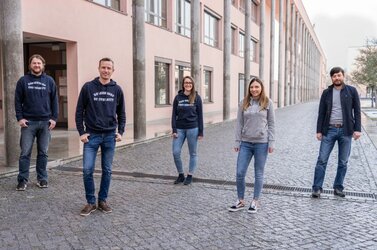
The Deggendorf Institute of Technology (DIT) is once again receiving funding to intensify its start-up work. As part of the funding priority "regional networking", a sustainable, regionally anchored start-up culture is to be established through networking in the rural region in the area of Eastern Bavaria. Austria and the Czech Republic are also a focus of the project. Almost one million euros are available to the DIT Start-Up Campus team from the Federal Ministry for Economic Affairs and Energy.
The university wants to create more start-ups and thus more jobs for the region. The DIT Start-Up Campus team is not the only one advising the founders. Professors and academic staff at the university make themselves available as mentors and DIT alumni from the field are arranged as contacts for exchanging experiences. Companies, politicians, business associations, start-ups and government institutions in the rural region are also asked to participate in the regional network. A major challenge at present is to hold all events virtually. Nevertheless, the best possible effort is being made, because regular network meetings, the transfer of know-how and the exchange of ideas among the founders are enormously important. For example, the monthly information events on the topic of start-up financing or the start-up regulars' table take place via Zoom. There is a range of digital seminars especially for women, such as Female Empowerment. A female founder, who herself studied at DIT, also reports on her self-employment in the virtual alumni founder talk. Those interested in founding a company with an exciting idea are invited to contact the DIT Start-Up Campus. Particular attention is paid to innovative or high-tech start-ups. The Start-Up Campus team advises not only students, but also alumni and staff of the university.
Since 2002, the university has gradually built up its profile as a start-up university. Over the years, numerous successful start-ups, activities and qualification offers have resulted, so that in 2017 the Start-Up Campus team was finally formed from DIT's Institute for Start-ups as a central point of contact. The university can further strengthen its activities through the funding measure "regional networking - establishing a sustainable, regionally anchored start-up culture" Exist V Potentiale of the Federal Ministry for Economic Affairs and Energy.
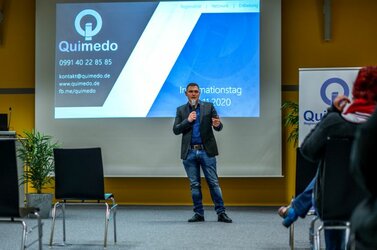
The Deggendorf-based start-up Quimedo has taken second place in this year's Ideenreich business plan competition. The competition, sponsored by Bayern Kapital, is organised by BayStartUP and takes place in cooperation with the Gründerzentrum Digitalisierung Niederbayern (GZDN). Innovative founders from south-eastern Bavaria who are in the process of setting up a company are supported. In this context, Dr. Timo Steininger, founder of Quimedo, also applied and convinced the jury.
The idea of the start-up was born in 2019, namely to digitalise and simplify the transition of patients from inpatient treatment to rehabilitation/nursing or from home to care with the app Quimedo. Via the app, healthcare facilities enter free capacities as well as possible forms of treatment. Within a very short time, patients can be referred directly to the right place for optimal treatment. The digital networking is an enormous relief for the nursing staff. The start-up was founded in October 2020, with Prof. Dr. Thomas Geiß and Prof. Dr. Christian Rester from the Faculty of Applied Health Sciences supporting the team throughout the entire start-up process. Quimedo is based in Deggendorf with founder Dr. Timo Steininger, co-managing director Stefan Klein and four employees. They use the coworking space of the start-up centre at ITC1, where Thomas Keller (managing director of ITC1) is a strong partner. An important factor of the app is user-friendliness. Therefore, the platform should also be put through its paces. Students of the Health Informatics degree programme agreed to check the usability of the Quimedo app during the test phase. In January 2021, the time had come - the app could go live. Since then, it has been confirmed that the platform works very well. A large number of successful patient referrals have already been made. The Deggendorf Institute of Technology (DIT) is a valuable partner for Quimedo. DIT has been heavily involved in building up the network in the eastern Bavarian region. In the meantime, many joint projects are underway, such as AI in care. Founder Dr Timo Steininger himself will be head of the practical nursing department at the Faculty of Applied Health Sciences from 1 April 2021. One of Steininger's goals is to dovetail science and Quimedo in the long term.
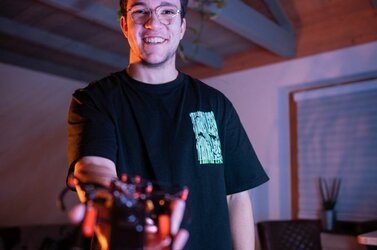
Daniel Fuchs is the founder of the start-up threesixty-drones. His business idea is based on a specially designed drone for 360-degree video recording. Less than a year after presenting his innovation at the Deggendorf Institute of Technology (DIT), the 21-year-old is an independent entrepreneur and offers the creation of promotional videos using drones as a service. The "Kickstart Incubator" funding programme, which is still fairly new at the university, helped him along the way.
Innovative technology-oriented start-up projects or services with high customer value can apply for the Kickstart Incubator programme. For Daniel Fuchs, this was one of the most decisive factors, as it enabled him to finance the construction of the first prototype of the drone and part of his equipment. Particularly important for him was a free patent consultation, which he was able to take advantage of through the Kickstart Incubator programme. That's because the drone can capture 360-degree video footage without being visible in the video itself. Such footage was previously impossible with other 360-degree drones due to their size and inertia, making the project unique. Flying the drone creates realistic virtual tours of buildings. It can also easily fly over sensitive locations near people. Thus, for example, it is possible to fly past athletes at indoor sporting events up close and with maximum maneuverability as well as speed, or to fly between the dancers' feet at dance events.
During the 6-month funding phase, Daniel Fuchs was able to continuously draw on selected experts from DIT and the Start-Up Campus Team and exchange ideas with other founding teams. He also survived a drone crash or two. And even found a company partner. Together, they are now working on their first orders. You can contact Daniel Fuchs via his Instagram channel or via e-mail: mail@threesixty-drones.com
About the incubator programme
The Kickstart Incubator is a newly created programme for all founders of tomorrow. Innovative technology-oriented start-up projects or services with high customer value can apply for the programme. After successfully presenting the idea, the first step is to develop the business model and build the founding team. Selected experts from DIT and the Start-Up Campus team act as coaches and mentors for the young founders. Free access to the premises of the StartupLab creates a creative working environment and enables the exchange with other founding teams. With up to € 7,500 in funding per team, nothing stands in the way of building the first prototype. After completion of the incubator programme, the teams are ideally equipped for the upcoming start-up and ready for subsequent funding such as the EXIST founder scholarship. More information about founding can be found here: https://www.th-deg.de/startupcampus-en
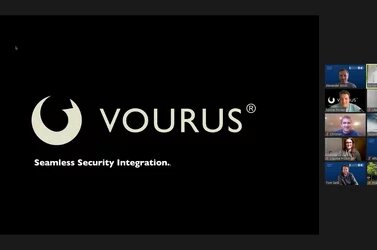
New start-ups from the ranks of the Deggendorf Institute of Technology (DIT) are not long in coming: the university is currently supporting the start-up “Vourus”. A company that wants to gain a foothold in the field of IT security. In particular, companies that process sensitive data can benefit from the start-up’s services.
The founders behind Vourus are Nicolai Roider and Sebastian Schreiner. Already as teenagers, they worked together on various projects in the technical field. Very quickly, they recognised the increasing relevance of data security and decided to set up a company together. Nicolai Roider studied business administration in the commercial area and Sebastian Schreiner is an IT specialist for application development in the technical area. At DIT they have the chance to put their plan into practice with a start-up scholarship. They are supported by the DIT Start-Up Campus, the Hans Lindner Foundation and Prof Dr Thomas Geiß as mentor.
The idea of the Vourus founders is to make the exchange and transfer of data more secure. To this end, they have developed an encryption system that is intended to offer the highest possible security. It ensures that only authorised people can access sensitive data. It immediately recognises whether files are in their original state or have been changed after being sent. Another advantage over conventional systems is that users can be deprived of decryption rights afterwards. The young founders have already concluded the first partner contracts with software manufacturers. The start-up is therefore planning to expand its resources, especially by adding staff in the areas of development and sales.
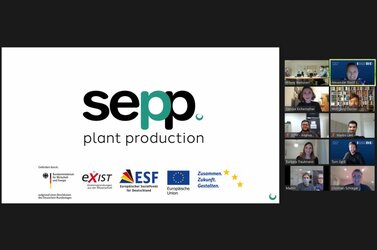
Since August 2020, four students at the Deggendorf Institute of Technology (DIT) have been pursuing the vision of developing a vegetable robot for hobby gardeners with their start-up SEPP. SEPP is funded by an EXIST start-up grant from the German government and supervised by the DIT Startup Campus team. The first milestone was the interim presentation to the SEPP start-up network on 15 December 2020. The team presented the results of the business plan preparation as well as the current development status of the prospective start-up.
The team around Andreas Stockinger - Martin Seidl, Martin Leitl and Sandra Eichenseher- was able to realise a first prototype in the last few months thanks to the funding provided. The start-up’s vision is a vegetable robot for Smart Efficient Plant Production (SEPP). The aim is to make it easier for hobby gardeners to grow vegetables in their home gardens by automating the vegetable patch. Thus, even those who previously had little time for gardening can enjoy the benefits of self-sufficiency in vegetables. They were supported in this by their mentor Prof Dr Wolfgang Dorner and the Startup Campus of DIT. By the upcoming gardening season in 2021, the team would like to be able to build a functioning robot. Automated watering and weeding should then be possible outdoors for the first time. The young founders plan to enter the market in spring 2022.
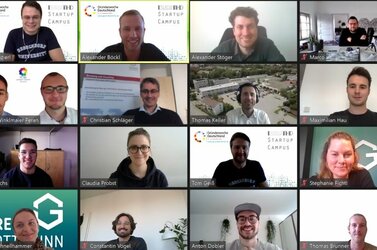
The Deggendorf Institute of Technology (DIT) has been working for several years to ensure that great business ideas from students do not simply disappear into a drawer. Students who would like to set up their own business can rely on the university’s Startup Campus team and a network that has grown considerably in the meantime. The university’s central information event is the Start-up Day. This year, it took place on 18 November as a virtual event.
In several lectures more than 180 participants got to know the contact people of the university, the Hans Lindner Foundation, the Digitalisation Start-up Centre Lower Bavaria and the Digital Start-up Centre Rottal-Inn Freyung Grafenau. All of them offer their support and competence on the way to independence. Time for exchange and networking among students was also planned for the Founders’ Day. Five start-ups presented their ideas and some of them were still looking for fellow entrepreneurs. At the end of the event there was still knowledge about brand management and the opportunity to ask questions in small groups.
Students who would like advice or would like to contact other start-ups can always contact the Startup Campus team. Prof Dr Thomas Geiß, Alfons Weinzierls and Alexander Böckl are available for initial contact via e-mail at startupcampus@th-deg.de.
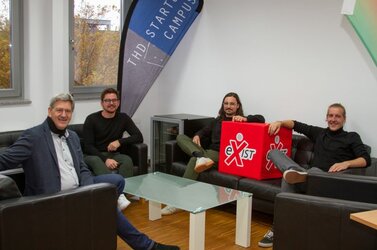
A new founding idea is currently gaining momentum at the Deggendorf Institute of Technology (DIT). It is about digitalisation in tool and mould making. The companies in this sector are usually very well equipped in terms of technology. However, full utilisation of their resources is not always possible. Three students at DIT now hope that their idea will optimise the process chain from incoming orders to quality management in such a way that capacities are fully utilised and costs and time can be saved at the same time.
Tool and mould making is essential for any series production. However, the production of tools and moulds, i.e. unique specimens, can still be optimised. The start-up “ti4f” has developed a strategy in cooperation with the Application Laboratory Industry 4.0 of DIT in order to digitalise the process in tool and mould making throughout. Especially the processes of the highly complex one-off production can then be analysed and shortages can be detected. With the help of a self-learning knowledge database working in the background, strategies for process optimisation can be generated. Constantin Vogel, Thomas Brunner and Radoslaw Korek are the founders of the “ti4f” start-up. Their product is designed to such an extent that they can integrate it step by step into the consulting process. They are already in contact with the first test customers. This step serves to evaluate their know-how and enables them to gain new experiences. The next steps planned are the development of the “ti4f” brand, the founding of the company and the search for further beta customers.
Constantin, Thomas and Radoslaw came up with the founding idea while studying for a Master’s degree in Technology Management. In the lectures and practical courses in the Industry 4.0 application laboratory, they had debated a lot about the future of industry. They also discussed the problems of single-part production under the direction of Prof Dr Gansauge. “ti4f” is supported by the DIT Startup Campus and an EXIST start-up grant from the Federal Ministry of Economics and Energy. The major goal is to have an MVP for all digital applications by the end of the scholarship period in September 2021.

With its new incubator programme "Kickstart", the Startup Campus of the Deggendorf Institute of Technology (DIT) promotes unique projects and further expands the start-up culture at DIT.
The new programme "Kickstart" refers to the pre-founding phase and prepares students, employees and alumni of DIT and EXIST start-up grant in six months. Thanks to the programme funded by the Federal Ministry of Education and Research, the "Kickstart" projects can count on support of up to € 7,500 for the construction of a prototype. In addition, participants will be given access to the creative working environment in the new DIT Startup Lab and coaching by the experts of the Startup Campus Team.
With the first "Kickstart" project "fx-drones" by Daniel Fuchs, a 360° video drone is promoted, which is especially designed for indoor recordings. At less than 250g, the drone is so light and manoeuvrable that it is able to fly through small openings, windows or shelves and also over sensitive places near people without any problems. For example, it can fly past the athletes at sporting events and even between the feet of the dancers at dance events. With this concept, Daniel Fuchs is one of the first people in Germany to receive funding from the programme.
With the "scob" team, a second project has already been included in the "Kickstart" incubator programme. This is a career platform based on Artificial Intelligence, which helps companies and potential trainees to find each other and achieve the "perfect match" on the job market, so to speak.
The newly created incubator programme "Kickstart" is aimed at all founders of tomorrow and once again underlines the pioneering role of the DIT Startup Campus in the start-up scene. Further information on the programme can be found at: https://th-deg.de/en/students/career/startup-campus.
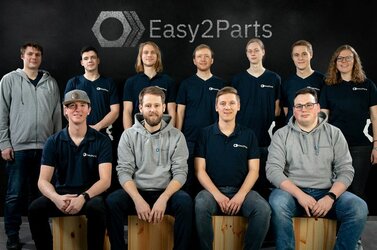
The start-up “Easy2Parts” from the ranks of the Deggendorf Institute of Technology (DIT) is on course for success. After 18 months as a young entrepreneur, the founding team convinced the BayStartUp investor network. Several investors are providing funding because they believe in the idea of “Easy2Parts”. The team of the university’s start-up campus has supported the start-up from the very beginning and is eagerly following the next steps.
A supply chain platform that intelligently links buyers and suppliers and automates parts procurement in industrial production. That is the idea behind “Easy2Parts”. The founders Robert Hilmer, Sebastian Freund and Michael Neuhauser came together through the university. Robert Hilmer studied business management while working part-time, while Sebastian Freund first studied industrial engineering and then went on to study general management in an MBA programme. Michael Neuhauser is a graduate of the Applied Computer Science programme. The team of the DIT Start-Up Campus, especially Prof Dr Thomas Geiss, offered a contact point and personal support. Together they developed the business model for “Easy2Parts” and prepared an idea paper for the application for their first financing package, the EXIST start-up grant. With the start-up grant, a steep upward trend began in March 2019. Five other employees are now part of the “Easy2Parts” team, they have found their office space in the ITC1 start-up centre in Deggendorf and they have successfully completed the Business Plan Competition “Ideenreich 2020”. Seed financing, i.e. start-up capital from companies that see the future potential of Easy2Parts, will enable Robert, Sebastian and Michael to get off to a completely different start. They can also count on the support from DIT. The founding team was and is supported by two professors of DIT as mentors: Prof Dr-Ing Ludwig Gansauge, who has been researching the networking of manufacturing companies for more than 20 years and also has extensive knowledge and networks in mechanical engineering. And Prof Dr Herbert Fischer, who supports the founding team with regard to software development, ERP systems and data protection, among other things.
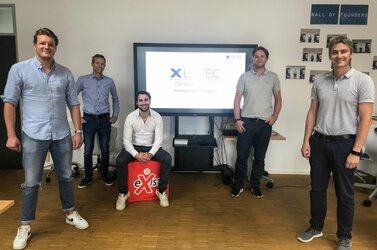
Software for IT security may soon come from Deggendorf. The Deggendorf Institute of Technology (DIT) is currently supervising the start-up company XENTEC. Financed by a scholarship, the two-member founding team wants to build up an IT security company. Initial product tests with pilot customers are already underway.
Nicolai Roider and Sebastian Schreiner want to create maximum IT security in all areas of the software industry and their own company. Their first product is to be a software with which other software manufacturers can protect their product. The mission is to set a new standard in data encryption and data protection.
They are supported by the DIT Start-up Campus, the Hans Lindner Foundation and by an EXIST start-up grant from the Federal Ministry of Economics and Energy. The two founders have already achieved quite a bit in their first half year as scholarship holders. The first Xentec product is patent pending. Initial tests have shown a positive response from pilot customers. Their feedback is currently flowing into the further development of the software. Anyone looking for Xentex on the Internet will have to be patient a little longer. The development work currently requires the full attention of the two founders.
The team of the DIT Start-up Campus is always open for innovative ideas. If you would like to become a founder, you can contact us via e-mail startupcampus@th-deg.de.

Founding team of the Startup Campus of the Deggendorf Institute of Technology (DIT) receives an EXIST founding grant of € 117,000 for the idea of the agricultural robot SEPP.
The idea is simple and ingenious: a robot that takes care of the domestic vegetable garden. The useful helper will make it easier for garden owners who do not have the time to regularly water or weed their garden. This is the vision of Andreas Stockinger and his two founding colleagues Niklas Rohne and Martin Seidl. With this idea, the team approached the DIT's Startup Campus and, with its support, received an EXIST start-up grant.
Supported by the scholarship in the amount of € 117,000, the prospective founders now have twelve months to turn the vision of the agricultural robot SEPP into a marketable product. During the development of the robot, the construction of the first prototypes up to the planning of a serial production, the founding team can count on the support of DIT and its Startup Campus, no matter if it is the solution of technical problems or the production of single metal components. If everything goes according to plan, home gardeners can hope for a significant reduction in workload because of SEPP for the 2022 gardening season.
The founders will be supported by their mentor Prof Dr Wolfgang Dorner and the DIT Startup Campus. The team of founders will move into the Startup Lab of the Startup Campus as their workplace during the funding period. The DIT's Startup Campus supports students, employees and alumni of the university in all phases of a business start-up.
The EXIST founding scholarship is funded by the Federal Ministry of Economics and Energy and the European Social Fund. In addition to students, the scholarship also supports graduates and scientists who want to implement their founding idea with a business plan.

Nothing we wear on our bodies is more contaminated with viruses and bacteria than our mobile phones. "CuCase", a start-up from the Deggendorf Institute of Technology (DIT) launched a smartphone case that addresses this very problem. The special thing about it is that the copper alloy used is also effective against the SARS-CoV-2 corona virus.
Antibacterial mobile phone sleeves are already available. No surprise! We touch our smartphones up to 2,500 times per day, on wich an average of 100 different types of bacteria are found - not counting viruses. A market with growth potential. "Our phone case consists of a special copper alloy," explains Dennis Gerdts, inventor of the product and responsible for research and development at CuCase. "Copper," says the 24-year-old, "is one of the most effective materials in the fight against pathogenic germs. It eliminates more than 99% of bacteria." And it eliminates other microbes like the corona virus. Previous products do not have this important feature. Besides, their antibacterial effect diminishes over time. Due to the so-called halo effect of copper, which leads to up to 70% less microbes (viruses, bacteria and germs) settling in the immediate vicinity, the touch screen is also less contaminated when using a CuCase.
The Deggendorf-based company CuCase is still the only one in the world to pursue this approach - almost. Because the competition never sleeps. "At Vanderbuilt University in the USA are three students who are as far advanced as we are," reveals Gerdts. That's why we have to hurry. On 15 July, the distribution is finally supposed to get under way. For the market entry, most Apple iPhones will be covered first. However, other models are to follow soon. You buy the cases via the website of the Deggendorf start-up (www.cucase.de) and a few weeks later also via Amazon. Compared to conventional cases, the prices are in the middle segment. There is a special offer for the market launch. Also interesting: with every purchase of a CuCase you support Ärzte ohne Grenzen (Doctors without borders) in the fight against corona.
Besides Gerdts, Anton Dobler (25) and Marco Jülke (28) are also shareholders and managing directors of CuCase. Dobler, a prospective Master's graduate at DIT in Technology Management, is the Marketing and Sales Manager and sees himself as an interface between the economic and technical areas. Jülke, a graduate in Economics, is responsible for finances, administration, production and logistics. All three can look back on numerous practical experiences in renowned industrial companies and on well-known internet platforms.
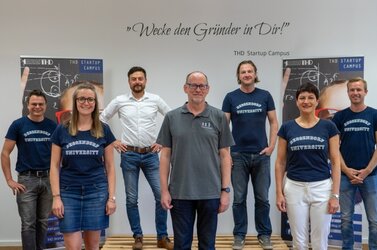
The Deggendorf Institute of Technology (DIT) is intensifying its foundation work. The thematic focus on start-up and start-up culture is to be expanded and the range of courses on offer, which up to now has mainly addressed students, is to be expanded. The team of DIT's Startup Campus has had almost € 900,000 at its disposal since April. The Federal Ministry of Education and Research supports the university's plan to promote entrepreneurial talent.
The Startup Campus team wants to create more start-ups and thus up to 1000 more high-tech jobs in the Deggendorf area in the next 10 years. Alfon Weinzierl says: "The work of the Startup Campus has so far been a cross-sectional function for many players in addition to their actual jobs and has been performed on top. With the successful project award we now also receive the necessary means and resources to take the DIT's start-up culture to the next level". According to Weinzierl, in comparison to the current situation, the Startup Campus will not only supervise the start-up and entrepreneurship teaching and student teams, but will also become a university-wide institution that is a contact point and home for founders at a central location and radiates into the rural region via the Technology Campuses. In future, the team will also be available to employees of the university. True to the motto "Wake up the founder in you!", everyone is invited to contact the Startup Campus team and develop their founding idea.
Many individual measures will now be implemented step by step. As a first necessary step, the team of DIT Startup Campus sees the development and renting of suitable premises close to the university to create a Startup Lab. Furthermore, it is planned to initiate a university incubator programme for the pre-foundation phase for university members, with which the university can then also financially support projects.
Since 2002, the university has successively built up its profile as a start-up university. Over the years, numerous successful business start-ups, activities and qualification offers have resulted, so that in 2017, the team of Startup Campus was finally formed from the Institute for Business start-ups of DIT as a central contact point. In the recently published WURI ranking, the university has attracted positive attention, particularly because of its start-up culture. The university can further strengthen its activities through the StartupLab@FH funding measure "Entrepreneurial thinking and scientific entrepreneurial spirit - freedom for research and start-ups at universities of applied sciences" of the Federal Ministry of Education and Research.
The most recent participants of the Silicon Valley Program of the Deggendorf Institute of Technology (DIT) began their exciting nine-month journey in mid-July. They want to bring a business idea to the market and learn how to do it with help from the Silicon Valley Program. The role model is the Silicon Valley start-up scene in California, where the journey will continue for a week at the end of the certificate programme.
The eight groups laid the foundation for marketing their projects during the introductory week. Each project group got to know their mentor from Santa Clara University in Silicon Valley, California, via video conference. The American elite university has been a partner in the certificate programme since the beginning. Over the next nine months, the project groups will contact their mentors once a month via video conference and present the progress of their work. Prof Peter Schmieder, founder of the programme, and Alexander Dorn will support them in this process. In addition, the participants will be provided with working documents online via a learning platform.
The airm of the programme is to make the teams or their business ideas eligible for investment. The participants will be supervised until the final pitches, which will take place in March 2021 at Santa Clara University if the corona situation allows it. Often, howver, is is only then that the participants really get started. If investors are found when their business plans are presented, the dream of their own company could quickly come true, like it has for many previous participants.
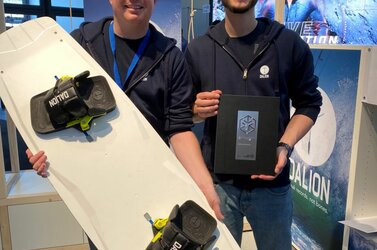
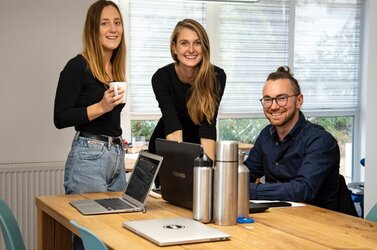

 Die Startup Community wächst – Gründertag an der TH Deggendorf
Die Startup Community wächst – Gründertag an der TH Deggendorf
05.12.2019 | THD-Pressestelle - An der Technischen Hochschule Deggendorf (THD) interessieren sich immer mehr junge Menschen für eine berufliche Selbstständigkeit. Rund 50 Teams werden derzeit von den Experten des THD Startup Campus betreut. Alle verfolgen die Absicht, sich selbstständig zu machen oder haben den Schritt bereits gewagt. Passend zur bundesweiten Aktion „Gründerwoche Deutschland“ fand Ende November eine Infoveranstaltung an der Hochschule statt, um noch mehr Studierende auf das Thema Selbstständigkeit neugierig zu machen. Das Motto des Gründertags lautete „Wecke den Gründer in dir“.
Zum vierten Mal fand der Gründertag an der TH Deggendorf statt und mit einem gefüllten Hörsaal B004 nahmen rund 150 Studierende an der Veranstaltung teil. Welche Unterstützung ein Startup an der THD erwartet, erfuhren die Studierenden vom Team des THD Startup Campus, von der Hans Lindner Stiftung durch Christian Schläger und vom ITC1/GZDN durch Thomas Keller. Zum Beispiel wurden kürzlich zwei Startups (Dalion, Lumoo) mit dem eXIST Gründerstipendium ausgezeichnet berichtet Alexander Böckl vom THD Startup Campus: „Die Bewerbung für das Stipendium läuft in Kooperation mit der Hochschule. Wir beraten und betreuen die Studierenden dabei. Während des gesamten Förderzeitraums bleiben wir regelmäßig miteinander in Kontakt.“
Zeit zum Austausch und Netzwerken unter Studierenden war beim Gründertag ebenfalls vorgesehen. Fünf Startups präsentierten ihre Ideen und suchten zum Teil noch nach Mitstreitern:
- OMNIA (Justen Deifel) - Digitale Identitäten Speicherung in der Blockchain
- Grünblatt (Waldemar Meier, Manuel Wedler, Nikunj Mathukiya) – Aquaponic, Autarkes Gemüsebeet mit Fischen für die Nährstoffversorgung
- Cucase (Dennis Gerdts, Marco Jülke, Anton Dobler) - Antibakterielle Handyhülle
- Dalion (Markus Zaglmann) - Neuartige Sicherheitsbindung im Wassersport
- Hackroboter (Andreas Stockinger) - Unkraut-Hackroboter namens HacklSepp
Studierende die sich beraten lassen oder Kontakt zu den genannten Startups aufnehmen möchten, können sich jederzeit an das Team des THD Startup Campus wenden. Prof. Dr. Thomas Geiß, Alfons Weinzierl und Alexander Böckl stehen per E-Mail unter startupcampus@th-deg.de als Erstkontakt zur Verfügung. Unterstützt wurde der Gründertag vom Career Service der Technischen Hochschule Deggendorf.
Bild (THD): Hochschul-Präsident Prof. Dr. Peter Sperber begrüßte die Studierenden beim Gründertag. Er betonte die Wichtigkeit des Themas Selbstständigkeit und dass die THD weiter in dieser Richtung unterstützen wolle.
contact
You got an exciting idea and would like to start your own business?
Contact us at startupcampus@th-deg.de or visit us in person in the Startup Lab (Veilchengasse 2, second floor).
head of centre for entrepreneurship
Team Entrepreneurship sensitisation
Team Start-up qualification
Team Incubation
newsletter registration
You'd like to stay informed, up-to-date and don't want to miss any events?
Simply register for our newsletter via idm.th-deg.de
In case you don't have a th-deg e-mail address, just message us via startupcampus@th-deg.de, lettung us know you'd like to subscribe to our newsletter.


